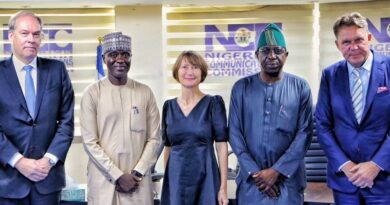Electoral Act Amendment Bill: Playing Ludo With Our Electoral Process
By Kazeem Akintunde
The title of this piece is not original to me. It was coined by my former boss and editor, Simon Kolawole in one of his write-ups few years ago. I find it hard to believe that we are still debating whether the President will assent to the reworked electoral Act Amendment Bill which was sent back to him when the previous one was rejected by our man from Daura. The Independent National Electoral Commission, INEC, is torn between the devil and the deep blue sea as the waiting game continues. With few months to the next general elections, we still don’t have a clear-cut road map on how the process will pan out and the relevant laws that will guide the exercise.
The Senate President, Ahmed Lawan, in December last year, informed his colleagues that the President had decided to withhold assent to the Electoral Amendment Bill 2021, passed by both the Senate and House of Representatives.
Many Nigerians were shocked when the President refused to assent to the Bill due to the fact that they believes there are provisions in the Bill that could strengthen our electoral process. Indeed, the Electoral Act amendment Bill 2021 makes provisions for the usage of card readers; clearly forbids members of political parties from taking up employment or appointment in INEC; clearly defines over-voting, and makes provision for electronic transmission of results. Aside from these, it also makes direct primaries compulsory for all political parties in choosing their various flag bearers.
Mr. President, on receipt of the Bill, promised to consult widely before he would append his signature to the Bill and indeed, wrote to the INEC, the Attorney-General and Minister of Justice of the Federation to seek their inputs. It was not a surprise when Mr. President refused to assent to the Bill sighting various reasons why the Bill could not see the light of day.
One aspect of the Bill that the President was not comfortable with was the direct primaries clause hence his decision to throw away the baby with the bathwater.
President Buhari noted that compulsory direct primaries will lead to an increase in cost to political parties and INEC in the conduct of direct primaries in 8,809 wards across the country; make life difficult for small political parties; overstretch security agencies; violate freedom of choice by political parties and give rise to litigations. The President also noted that it will lead to an increase in vote-buying while also arguing that direct primaries are susceptible to manipulation.
Those were the reasons the President gave for withholding assent but political pundits assert that the real reason Mr. President withheld assent was the supremacy battle between state governors and the lawmakers for the control of the political parties ahead of the 2023 General Elections. Many political watchers are of the view, and rightly so, that it was state governors that put pressure on the President not to sign the Amendment Bill as the Direct Primaries clause was inserted by the lawmakers to take the control of the political parties away from the governors. Though many lawmakers were angry that the president refused to sign the Act into law, the possibility of overriding the President by invoking section 58 (5) of the 1999 constitution was considered, but the lawmakers at the end of the day decided not to toe the combative posture and agreed to rework the Bill to satisfy the President.
Both chambers of the National Assembly went back to the drawing board and came up with a new Electoral Act which was forwarded to the President on January 31st. Senior Special Assistant to the President on National Assembly Matters (Senate), Senator Babajide Omoworare, in a one-page statement, titled, “Transmission of the Electoral Bill 2022,” stated that the Clerk to the National Assembly, Mr Olatunde Moses Ojo, had transmitted authentic copies of the bill to the president in accordance with the provisions of Section 58 (3) of the 1999 Constitution of the Federal Republic of Nigeria (as amended) and the Acts Authentication Act Cap. A2 LFN 2004. The release read in part, “The Clerk to the National Assembly Mr. Olatunde Amos Ojo, has transmitted the authenticated copies of the Electoral Bill 2022 to the President of the Federal Republic of Nigeria Muhammadu Buhari, GCFR, on 31st January 2022. “This was done in accordance with the provisions of Section 58 (3) of the 1999 Constitution of the Federal Republic of Nigeria (as amended) and the Acts Authentication Act Cap. A2 LFN 2004. “Mr. President had withheld assent to the Electoral Bill 2021 transmitted to him on 19th November 2021. The Electoral Bill was thereafter reworked by the National Assembly and both the Senate and the House of Representatives passed same on 25th January 2022.” Both National Assembly it its wisdom allow political parties to choose from the three modes of primaries it recommended for the nation. The harmonised version now accommodates direct, indirect, and consensus modes of primary election.
This is where the lawmakers are likely to get their pound of flesh from the Governors as they (the Governors) are not again comfortable with the consensus arrangement introduced by the lawmakers. On Direct Primaries in section 84 (4), the amended version provides, “A political party that adopts the direct primaries procedure shall ensure that all aspirants are given equal opportunity of being voted for by members of the party and shall adopt the procedure outlined below: “(a) In the case of Presidential Primaries, all registered members of the party shall vote for aspirants of their choice at a designated centre at each ward of the Federation. “(b) The procedure in paragraph (a) above of this subsection shall be adopted for direct primaries in respect of Gubernatorial, Senatorial, Federal and State Constituencies.” On Indirect Primaries, the bill provides under 84(5), “A political party that adopts the system of indirect primaries for the choice of its candidate shall adopt the procedure outlined below: “(a) In the case of nominations to the position of Presidential candidate, the political party shall – (i) hold a Special Presidential Convention at a designated centre in the Federal Capital Territory or any other place within the Federation that is agreed to by the National Executive Committee of the party where delegates shall vote for aspirants of their choice. “(ii) The aspirant with the highest number of votes cast at the end of voting shall be declared the winner of the Presidential primaries of the political party and that aspirant’s name shall be forwarded to the Commission as the candidate of the party.” On Consensus Candidate the bill in 84(9) (a) provides, “A political party that adopts a consensus candidate shall secure the written consent of all cleared aspirants for the position, indicating their voluntary withdrawal from the race and their endorsement of the consensus candidate.”
Again, the Governors felt that another bobby-trap had been laid for them and have vowed to mount pressure on the president to withhold his assent until two clauses are amended or dropped. The clauses in contention resolve around resignation by appointed political office holders, including ministers, commissioners and others before 2023 election primaries; and the ‘unworkable’ consensus option in picking candidates by political parties. In Nigeria, it is rampant for appointed political office holders to remain in office while contesting in their party’s primaries. The governors believe that Senators and the Representatives put the difficult clause on the consensus to stop the governors from imposing any anointed aspirant.
However, Opposition federal lawmakers have asked President Buhari to assent to the reworked Electoral Bill Amendment Bill 2022 without further delay. Leader of the caucus, who is also the Senate Minority Leader, Senator Enyinaya Abaribe, and his counterpart in the House of Representatives, Ndidi Elumelu, said that it is incumbent on the President to sign the bill as they have ensured that everything he complained about has been given to him.
“Now that we have bent backward, no excuse or reason should be given again. Provisions of the bill are very critical for expected credibility of the 2023 general elections,” he said.
Elumelu alleged that some APC governors are again plotting to stop the President from assenting to the reworked bill. He, however, urged President Buhari not to yield to the request of the governors but sign the bill owing to its importance in strengthening the country’s electoral process.
He said: “We met them, they said they want direct primary. We said okay, if it will mean giving Nigerians a very sound electoral reform, we will accept it.
“They came back again and said, oh, we have rejected it, we now want indirect primary. We said we agree, but give Nigerians electoral reform. They came back again and said, we want consensus. We have added consensus to the amendment.
“Again, I am hearing that, among them, those APC governors, with their wuru-wuru, are still plotting for the president not to sign. Nigerians are tired of APC. We promise not to let the people down. That is why we are asking APC and President Buhari to sign the Electoral Bill. Sign it, Nigerians want it signed. No more delay.”
Again, Malami has hinted that President Buhari may withhold assent from the Electoral Act (Amendment) Bill if it is considered to have proposals based on personal interests.
As the ding-dong continues, the President has not said a word. While the 30 days constitutionally allowed for him to either sign or reject the Bill has not lapsed, INEC is in limbo waiting for the laws that will guide it in the conduct of the polls which has been turned to a battle of ego and political interest. Are our leaders not playing Ludo with our electoral process and indeed our lives?
See you next week.



